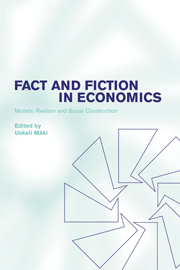Book contents
- Frontmatter
- Contents
- Notes on the contributors
- Preface
- I Introduction
- II Setting the scene
- 2 Ugly currents in modern economics
- 3 Modern economics and its critics
- 4 Some nonreasons for nonrealism about economics
- III Economic models and economic reality
- IV The constitution of economic reality
- V The institutions of economics
- Index
- References
2 - Ugly currents in modern economics
Published online by Cambridge University Press: 22 September 2009
- Frontmatter
- Contents
- Notes on the contributors
- Preface
- I Introduction
- II Setting the scene
- 2 Ugly currents in modern economics
- 3 Modern economics and its critics
- 4 Some nonreasons for nonrealism about economics
- III Economic models and economic reality
- IV The constitution of economic reality
- V The institutions of economics
- Index
- References
Summary
Introduction
The last few years have seen an astonishing series of books and articles with titles like The Decline of Economics (Cassidy 1996), The Crisis of Vision in Modern Economic Thought (Heilbroner and Milberg 1996), Against Economics (Kanth 1996), The End of Economics (Perelman 1996), and even The Death of Economics (Omerod 1994). A survey of graduate students in elite American universities by Arjo Klamer and David Colander (1987, 1990) revealed a striking lack of interest among young would-be economists either in the economy or in the literature of economics; success in the economics profession, they shrewdly perceived, came principally to those with a knowledge of mathematical economics and econometrics. The study sparked a chorus of complaints about the nature of economic research and training at top universities in the Western world and led in 1991 to a full-scale report of a Commission on Graduate Education in Economics (1991) sponsored by the American Economic Association. The commission included leading figures in the economics profession and, like all such reports, produced a blend of various views in which, however, one dominant note appeared repeatedly: economics as taught in graduate schools has become increasingly preoccupied with formal technique to the deliberate exclusion of historical and institutional understanding. More recently, John Hey (1997), the Managing Editor of The Economic Journal, the leading economics journal in the UK, looked back over ten years of his editorship and summed up his appraisal of the type of papers that were regularly submitted to the journal:
Many of the submissions do not appear to be written in order to further economic knowledge.[…]
- Type
- Chapter
- Information
- Fact and Fiction in EconomicsModels, Realism and Social Construction, pp. 35 - 56Publisher: Cambridge University PressPrint publication year: 2002
References
- 36
- Cited by



